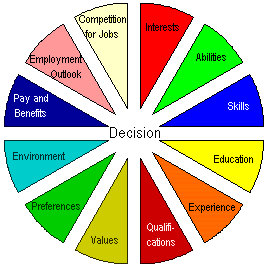This section is designed to help you make decisions and action plans where the career choices are difficult to make.
When making career decisions, compare each job that you're considering with your own interests, abilities, qualifications and personal preferences. Also compare the various career options with each other to help you decide which is the best one for you.
Comparing Careers
General Advice
Expressing Interests through Non-Work Activities
Final Thoughts
Factors to Consider
Below we have provided examples of factors to consider. Although they are shown here in Pie Chart format, don't assume that these are the only factors to consider or that they should all be given equal weight. This is only designed to show that there are a wide range of factors that inform any good career decision.

Comparing Careers
You will want to consider each job in terms of how it fits you. Eliminate the jobs that are a poor fit. For example, if you hate the sight of blood you probably will not want to become a surgeon. But there are other occupations in health care that you may enjoy. Once this is done, your choices may become more difficult. The Career Comparison Checklist can help. Its purpose is to help you recognize the factors that may influence your career decision. Which factors are most important to you? Deciding will require careful reflection on your part.
Feel free to modify this example to include considerations that are important to you.
There are many considerations when exploring careers, making decisions, and preparing for action. Make sure that any checklist you use includes all of the things that are important to you. This will make it easier to compare your career options against each other on every consideration.
Look Across Careers: Filling in your Career Comparison Checklist
Make notes about each job AND any differences you note among your career options. For instance, is one option clearly better than all others on a certain consideration? For example, does one job pay significantly more than the others? If so, make a note of it. Go on to the next consideration on your checklist once you've finished the first. Repeat this process until you've compared all your career options on each consideration.
Reviewing your checklist - Getting the Big Picture
Once you've finished making notes across your Career Options on all considerations, take another look at your Career Comparison Checklist. This time review your notes about each job looking down the list of considerations. For example, look at the qualifications, abilities & skills, interests, etc. for Career Option #1. Then do the same for Career Option #2 and so on. This will let you see how each individual career stacks up against all your considerations.
Then compare the Career Options again. This time you will be looking at the overall, or big picture, across considerations. You may note some tradeoffs in the options. For instance, the highest paying jobs may require the most in terms of qualifications. It may be easier to become qualified for other jobs, but you may face greater competition because many other people are also qualified for these. You will probably find several examples of such tradeoffs.
General Advice
If you've done your homework, considered the options, and have decided that one job group is much better than all of the others, work backward from that career. This way you can obtain the necessary education and other qualifications to meet minimal requirements for the job you want the most. Also, you may want to try to make plans that keep a variety of options open to you for as long as possible. In this way you can be prepared for a variety of satisfying alternatives if your first choice career doesn't work out.
Expressing Interests through Non-Work Activities
It is very difficult to find a job that will satisfy ALL of your interests. After finding the best career possible, explore your other interests in hobbies or volunteer work (Verhoeve,1993). This can help you lead a very happy and satisfying life.
Final Thoughts
Exploring and deciding on career options and educational programs requires you to gather information about yourself, possible careers, and to carefully reflect on the many options you have. Also, career planning is not a one-time activity. Interests sometimes change as you gain experience and are exposed to new areas. You may want, or need, to change careers several times during your working life.
If you plan correctly, you will be working towards a satisfying career, while keeping your options open. This way, if your first choice career doesn't work, you will have backups.
Set difficult goals for yourself and stretch your limits. At the same time be realistic when developing plans and setting goals. Be open to the many possibilities that exist. Combining all of these suggestions means that you should strive for your most preferred career, taking into account your own abilities as well as your interests. You should also be aware that there are thousands of different possibilities from which to choose. If your top choice doesn't work out, you should still be able to find a career that you will find rewarding.
We wish you the best of luck in finding a satisfying career.

